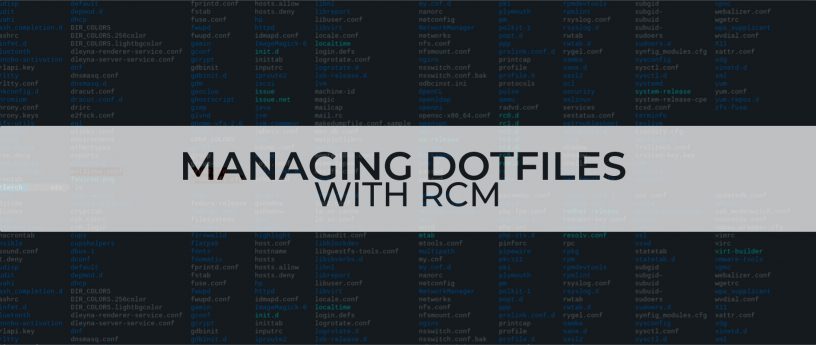mirror of
https://github.com/LCTT/TranslateProject.git
synced 2024-12-23 21:20:42 +08:00
117 lines
4.7 KiB
Markdown
117 lines
4.7 KiB
Markdown
|
|
[#]: collector: (lujun9972)
|
|||
|
|
[#]: translator: (geekpi)
|
|||
|
|
[#]: reviewer: ( )
|
|||
|
|
[#]: publisher: ( )
|
|||
|
|
[#]: url: ( )
|
|||
|
|
[#]: subject: (Managing dotfiles with rcm)
|
|||
|
|
[#]: via: (https://fedoramagazine.org/managing-dotfiles-rcm/)
|
|||
|
|
[#]: author: (Link Dupont https://fedoramagazine.org/author/linkdupont/)
|
|||
|
|
|
|||
|
|
用 rcm 管理隐藏文件
|
|||
|
|
======
|
|||
|
|
|
|||
|
|

|
|||
|
|
|
|||
|
|
许多 GNU/Linux 程序的一个特点是易于编辑的配置文件。几乎所有常见的自由软件都将配置设置保存在纯文本文件中,通常采用结构化格式,如 JSON、YAML或[“类 ini”][1]。这些配置文件经常隐藏在用户的主目录中。但是,基本的 ls 不会显示它们。UNIX 标准要求以点开头的任何文件或目录名称都被视为“隐藏”,除非用户请求,否则不会列在目录列表中。例如,要使用 ls 列出所有文件,要传递 -a 选项。
|
|||
|
|
|
|||
|
|
随着时间的推移,这些配置文件变得高度自定义,管理它们变得越来越具有挑战性。不仅如此,在多台计算机之间保持同步是大型组织的共同挑战。最后,许多用户对其独特的配置感到自豪,并希望以简单的方式与朋友分享。这就是用到 **rcm** 介入的地方。
|
|||
|
|
|
|||
|
|
**rcm** 是一个 “rc” 文件管理套件(“rc” 是命名配置文件的另一种约定,它已被某些 GNU/Linux 程序采用,如 screen 或 bash)。 **rcm** 提供了一套命令来管理和列出它跟踪的文件。使用 **dnf** 安装 **rcm**。
|
|||
|
|
|
|||
|
|
### 开始使用
|
|||
|
|
|
|||
|
|
默认情况下,**rcm** 使用 ~/.dotfiles 保存它管理的所有隐藏文件。托管的隐藏文件实际保存在 ~/.dotfiles 中,并保存符号链接在文件原本的位置。例如,如果 ~/.bashrc 由 **rcm** 跟踪,那么详细列表将如下所示。
|
|||
|
|
|
|||
|
|
```
|
|||
|
|
[link@localhost ~]$ ls -l ~/.bashrc
|
|||
|
|
lrwxrwxrwx. 1 link link 27 Dec 16 05:19 .bashrc -> /home/link/.dotfiles/bashrc
|
|||
|
|
[link@localhost ~]$
|
|||
|
|
```
|
|||
|
|
|
|||
|
|
**rcm** 包含 4 个命令:
|
|||
|
|
|
|||
|
|
* mkrc – 将文件转换为由 rcm 管理的隐藏文件
|
|||
|
|
* lsrc – 列出由 rcm 管理的文件
|
|||
|
|
* rcup – 同步由 rcm 管理的隐藏文件
|
|||
|
|
* rcdn – 删除 rcm 管理的所有符号链接
|
|||
|
|
|
|||
|
|
|
|||
|
|
|
|||
|
|
### 在两台计算机上共享 bashrc
|
|||
|
|
|
|||
|
|
如今用户在多台计算机上拥有 shell 帐户并不罕见。在这些计算机之间同步隐藏文件可能是一个挑战。这里将提供一种可能的解决方案,仅使用 **rcm** 和 **git**。
|
|||
|
|
|
|||
|
|
首先使用 mkrc 将文件转换成由 **rcm** 管理的文件。
|
|||
|
|
|
|||
|
|
```
|
|||
|
|
[link@localhost ~]$ mkrc -v ~/.bashrc
|
|||
|
|
Moving...
|
|||
|
|
'/home/link/.bashrc' -> '/home/link/.dotfiles/bashrc'
|
|||
|
|
Linking...
|
|||
|
|
'/home/link/.dotfiles/bashrc' -> '/home/link/.bashrc'
|
|||
|
|
[link@localhost ~]$
|
|||
|
|
```
|
|||
|
|
|
|||
|
|
接下来使用 lsrc 验证列表。
|
|||
|
|
|
|||
|
|
```
|
|||
|
|
[link@localhost ~]$ lsrc
|
|||
|
|
/home/link/.bashrc:/home/link/.dotfiles/bashrc
|
|||
|
|
[link@localhost ~]$
|
|||
|
|
```
|
|||
|
|
|
|||
|
|
现在在 ~/.dotfiles 中创建一个 git 仓库,并使用你选择的 git 仓库托管设置一个远程仓库。提交 bashrc 文件并推送一个新分支。
|
|||
|
|
|
|||
|
|
```
|
|||
|
|
[link@localhost ~]$ cd ~/.dotfiles
|
|||
|
|
[link@localhost .dotfiles]$ git init
|
|||
|
|
Initialized empty Git repository in /home/link/.dotfiles/.git/
|
|||
|
|
[link@localhost .dotfiles]$ git remote add origin git@github.com:linkdupont/dotfiles.git
|
|||
|
|
[link@localhost .dotfiles]$ git add bashrc
|
|||
|
|
[link@localhost .dotfiles]$ git commit -m "initial commit"
|
|||
|
|
[master (root-commit) b54406b] initial commit
|
|||
|
|
1 file changed, 15 insertions(+)
|
|||
|
|
create mode 100644 bashrc
|
|||
|
|
[link@localhost .dotfiles]$ git push -u origin master
|
|||
|
|
...
|
|||
|
|
[link@localhost .dotfiles]$
|
|||
|
|
```
|
|||
|
|
|
|||
|
|
在第二台机器上,克隆这个仓库到 ~/.dotfiles 中。
|
|||
|
|
|
|||
|
|
```
|
|||
|
|
[link@remotehost ~]$ git clone git@github.com:linkdupont/dotfiles.git ~/.dotfiles
|
|||
|
|
...
|
|||
|
|
[link@remotehost ~]$
|
|||
|
|
```
|
|||
|
|
|
|||
|
|
现在使用 rcup 更新受 **rcm** 管理的符号链接。
|
|||
|
|
|
|||
|
|
```
|
|||
|
|
[link@remotehost ~]$ rcup -v
|
|||
|
|
replacing identical but unlinked /home/link/.bashrc
|
|||
|
|
removed '/home/link/.bashrc'
|
|||
|
|
'/home/link/.dotfiles/bashrc' -> '/home/link/.bashrc'
|
|||
|
|
[link@remotehost ~]$
|
|||
|
|
```
|
|||
|
|
|
|||
|
|
覆盖现有的 ~/.bashrc(如果存在)并重启 shell。
|
|||
|
|
|
|||
|
|
就是这些了!指定主机选项 (-o) 是对上面这种情况的有用补充。如往常一样,请阅读手册页。它们包含了很多示例命令。
|
|||
|
|
|
|||
|
|
|
|||
|
|
--------------------------------------------------------------------------------
|
|||
|
|
|
|||
|
|
via: https://fedoramagazine.org/managing-dotfiles-rcm/
|
|||
|
|
|
|||
|
|
作者:[Link Dupont][a]
|
|||
|
|
选题:[lujun9972][b]
|
|||
|
|
译者:[geekpi](https://github.com/geekpi)
|
|||
|
|
校对:[校对者ID](https://github.com/校对者ID)
|
|||
|
|
|
|||
|
|
本文由 [LCTT](https://github.com/LCTT/TranslateProject) 原创编译,[Linux中国](https://linux.cn/) 荣誉推出
|
|||
|
|
|
|||
|
|
[a]: https://fedoramagazine.org/author/linkdupont/
|
|||
|
|
[b]: https://github.com/lujun9972
|
|||
|
|
[1]: https://en.wikipedia.org/wiki/INI_file
|